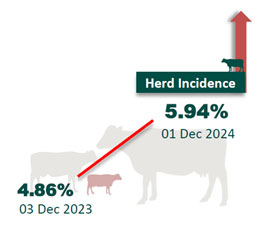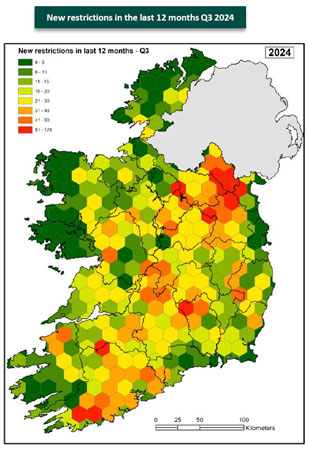
Denis Drennan
President, ICMSA
TB or not TB – what is the question?

The herd incidence (above) in 2024 has risen by over one percentage point over the course of just the previous 12 months. To put this in context, the herd incidence lay at 3.72 per cent in 2019. This shows that the incidence has risen as much in the 12 months up to December 2024 as it had risen in the previous four years!
Figure 2 shows where those new restrictions are being applied across Ireland but without the data for the six counties in the north of Ireland. The red patches indicate the areas where there have been the most frequent ‘new’ outbreaks while the green does not mean lowest incidence, but the lowest number of ‘new’ outbreaks. There are areas of the map in green that are among the worst affected areas in the State. Overall, now we have had over 40,000 reactor animals detected and removed in the last 12 months. The breakdown of this shows that over 70 per cent are dairy animals with the remainder either suckler or beef. In fact, as of the present time, we are looking at one in five of all dairy herds down with TB.
Where to from here?
At our national AGM, we heard the secretary general of the Department of Agriculture, Food and the Marine (DAFM), Brendan Gleeson, admit that he is losing sleep over the issue, and he was assured ‘from the floor’ that he is not alone. His anxieties are fully shared by farmers and not least the 6,000 herd owners currently restricted.
On that occasion, Brendan confirmed that there would be a new approach to TB in 2025 and he was assured that the ICMSA is of the firm believe that there needs to a complete overhaul of the programme. We know, for instance, that extra resources will need to be put into the wildlife programme focussed on ensuring that badgers and deer are contained. The picture is harder and more complex when we must look inside of our own farms.
The next and much more problematic question arises around the test and what happens if you go down. The test has limitations, these are well known, and no further use is served by listing them. But one fact does bear repeating and that is that even if you have a clear test, you cannot be certain that there is not a reactor still in the herd. This is especially the case if you have had an outbreak in the last three to five years. That fact is indisputable and based on all the data.
We are likely looking at extra restrictions being brought forward to deal with those cows that are in a herd that are testing clear – but have been in a herd that has been restricted. These animals are considered high risk and it seems certain that they will be treated differently into the future.
There will also be differences where farmers are asked to blood test their animals after a breakdown on the skin test. Statistics show that those herds who do blood tests after a skin test will last five times longer between breakdown than those who skin test alone.
Changes
The ICMSA is at the table of the TB Forum and is working progressively to ensure that those farmers whose herds are free from TB stay that way, and make sure those who are restricted get out of that category as quickly as possible. We will insist that farmers are treated with respect in all and every circumstance – and most specifically when they find themselves hit hard by the kind of surging TB stats that we see now.
But we must accept that changes – some of which may not be popular – must happen if we are to hold up and begin to push back on this surge. I must repeat what our deputy president said on the matter some months ago: “We cannot go on pursuing TB eradication measures that are demonstrably not working. We can’t keep doing what just is not working as bovine TB surges across farms all over the State.”
He is right. Whatever we do, we can’t stay doing what is obviously failing. ICMSA is ready to hear the new measures, and we’ll respond at that stage and in the interests of an effective eradication programme and, most importantly, in the interests of the farmers who are the ultimate victims of the present ineffective system. Quite clearly, treating all farmers involved fairly will be the decisive requirement.






